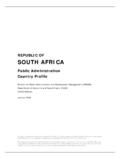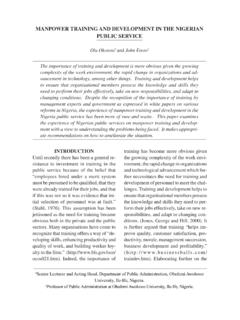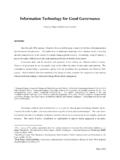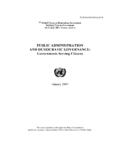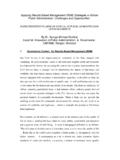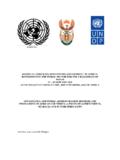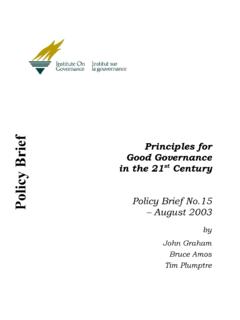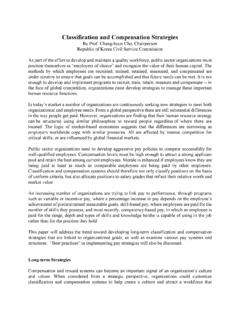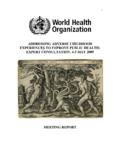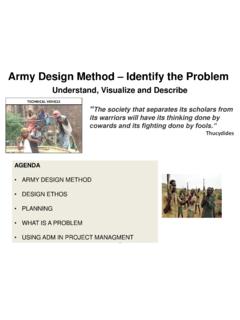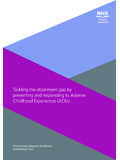Transcription of Gender, Governance and Conflicts in Africa - United Nations
1 gender , Governance and Conflicts in Africa By : Maria Nzomo Senegal Dakar -2002 2 Contents Table 1. Introduction .. 3 2. THE SELF- INFLICTED WOUND: Governance and Conflicts in Africa .. 3 3. Women's Role in Conflict Prevention, Management & Resolution .. 5 4. Role of Women in Political Decision-making on War and Peace .. 5 5. Women's Role During Conflicts : Women as Combatants and Service 9 6. Political Participation: Examples of African women as actors in Conflict and Post 10 7. Constitutional 12 8. Post-Conflict Economic Reconstruction .. 14 9.
2 Social Reconstruction .. 16 10. Concluding 18 3 1. Introduction "Civil War is Africa 's self-inflicted wound. More than one African in five lives in a country that is fighting a war, and nearly 20 countries have experienced civil war since 1960. The continuing Conflicts that ravage the African continent represent a heavy social and economic burden. During a war, most of the country's resources tend to be diverted away from development and towards supporting the conflict War is estimated to cost $1bn per year in Central Africa , without counting the cost of aiding refugees, which is estimated to be about $500m in the region" (Bolle, 2000: 61).
3 "Women's contributions to war and peace have long been underestimated. In fact, women often contribute to the outbreak of violence and hostilities in many cases, they are instrumental in inciting men to defend group interests, honour, and collective livelihoods. Women also play a key role in preserving order and normalcy in the midst of chaos and destruction. In times of conflict, when men engage in war and are killed, disappear or take refuge outside their country's borders, it is women who are left with the burden of ensuring family livelihood. Women struggle to protect their families health and safety a task which rests on their ability to cope pragmatically with change and adversity.
4 It is therefore not surprising that women are also a driving force for peace" (Sorensen, 1998: iii). "Women's under-representation or lack of involvement in official efforts at resolving internal state Conflicts is taken as a given in most situations. While they often bear the brunt of the war brutalities, and are increasingly involved in combatant activities, they are seldom part of the inner circles of peace negotiations, peace accords, or policies at the formal level to resolve conflict" (Boyd, 1994: 3). The above three quotes basically summarize the main thesis of this paper, which argues that most of Africa 's Conflicts and related disasters are self inflicted wounds arising from bad/ undemocratic Governance , partially manifested in gender inequities in the structures and processes of public Governance , which in turn are reflected in the near absence of women's voices in key decision-making on strategic issues, including those regarding war and peace.
5 This paper further argues that the question of resolving, managing and meaningfully addressing post-conflict reconstruction, cannot be divorced from the question of Governance , as sustainable peace cannot be assured in the absence of a conducive Governance framework. The paper also argues that despite women's marginality at the war-mongering tables, they are not only victims of war and other forms of violence, they are also active participants before, during and after civil war, serving as instigators, combatants, service providers, and reconstructors of the post-war battered political-economy and society. But in all of these roles, most of women's peace initiatives take place outside the formal Governance frameworks, and hence their long term impact/influence on the overall objective of sustainable peace, cannot easily be determined.
6 The paper therefore makes recommendations that suggest the vital need in all African countries for democratic Governance and, for greater participation of women in key positions of decision-making, including the military and other security related institutions. 2. THE SELF- INFLICTED WOUND: Governance and Conflicts in Africa The case is often made that Conflicts are caused primarily by economic underdevelopment, resource scarcity, widespread poverty and limited access to and participation in processes of 4political decisionmaking. While it is true that poverty generates tensions as people scramble for limited resources, such tensions cannot deteriorate into war, if institutions and mechanisms exist, that afford all citizens a conducive and enabling environment to earn a decent livelihood.
7 Similarly, whereas tensions are bound to arise in any society in the course of interaction between various competing social identities and beliefs, such tensions cannot degenerate into serious conflict, unless the country's existing Governance institutions, policies and ideologies are not adequately responsive to the diverse social identities and instead, tend to encourage social fragmentation rather than social cohesion. In such a situation, democratic culture of tolerance of social differences and beliefs, is also likely to be lacking. This kind of social context then becomes a fertile ground that can easily be exploited and ignited by the existing political leadership into a civil war, that only serves the hegemonic elite interests, rather than the interests of the country as a whole.
8 In my view therefore, most of the civil wars and violent Conflicts that have occurred in Africa during the second half of the 20th and now the 21st Century, have their roots in undemocratic structures and processes of Governance , unequal power and resources allocation, which are politicized and expressed in socio-cultural terms. In this connection, political leaders whip up and politicize citizen's ethnic, religious and racial diversities and use them as a means to justify and to get mass endorsement and participation in self serving wars. They do this not only because of their love of power, but because of their love for personal wealth which often degenerate into greed, exemplified in the licensing of economically motivated violence in such countries as Liberia and Sierra Leone (Berdal & Malone: 2000).
9 Such Conflicts therefore, are an indication that the Governance framework lacks democratic structures and mechanisms for equitable participation, allocation and distribution of power, and resources and for the development of multiculturalism, tolerance and accommodation of diverse socio-cultural ideological and religious beliefs. Once armed violence is allowed to become a means of addressing such internal problems, the result is not only the destruction of the economic and social infrastructure but also the prevailing institutions of Governance . So post-conflict reconstruction and attainment of sustainable peace entail the rebuilding of the social, economic, and political infrastructure and strengthening Governance institutions to make them conducive to and supportive of economic and social development on a just and equitable basis, regardless of gender , ethnic, religious, cultural, racial and other social identities within society.
10 Most African countries that have experienced violent/armed Conflicts are characterised by wide gaps in power, and resource distribution, both vertically among different classes, and horizontally among people belonging to different religions, ethnicities, clans, races, and regions. A close look at the historical and structural contexts of some of the major theatres of African civil wars and Conflicts , in Sierra Leone, Somalia, Sudan, Liberia, Rwanda, Republic of Congo etc, all indicate that undemocratic Governance was a major causal factor. Analyzing the Somali case, one scholar argues that misgovernance has been the root cause of the war situation that has prevailed in Somalia since 1991.
